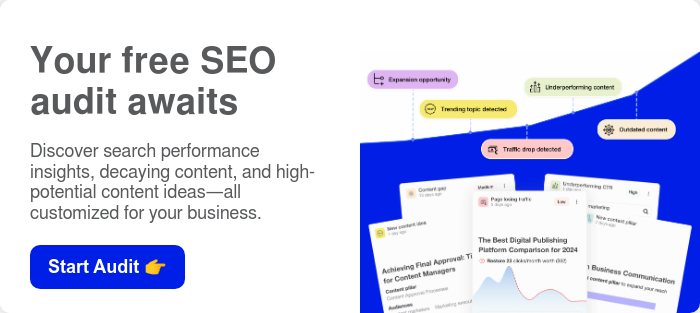Are you looking to enhance your client campaigns with targeted, innovative strategies? Do you want to streamline your workflow and improve efficiency? Look no further! In this comprehensive guide, we will walk you through the essential SEO deliverables typically provided to clients.
What exactly are the SEO deliverables that should be included in your client campaigns? From keyword research and on-page optimization to technical audits and link building, there are various components that contribute to a successful SEO campaign.
In this guide, we will break down each of these SEO deliverables into actionable insights, providing you with a clear roadmap for success.
Initial Setup and Website Quality Audit
1. Website Audit Report
A comprehensive analysis of your client’s current content and current website's performance is essential and the basis for your SEO deliverables. This report identifies technical issues, on-site SEO elements, low-quality pages, top ranking pages, and keyword gap analysis that need addressing to improve the site's overall health.
2. SEO Strategy Plan
A detailed SEO strategy plan outlines the approach, including target keywords, target audience, target pages, business goals, and timelines. This serves as a roadmap for the client campaign.

Get our free SEO Proposal Template here 👉 SEO Proposal Template to Win New Clients
3. Competitors Content Analysis
Understanding the client’s competition is crucial. An in-depth competitor analysis reveals their keywords, backlinks, and content strategies, providing insights into what works in their industry (and what doesn’t).
4. Keyword Research
Identifying relevant and high-traffic keywords is foundational when it comes to SEO deliverables. This involves analyzing industry trends, competition, and search volumes to select the best keywords to target.
Tip: Guide to Uncovering High-Value Keywords Your Competitors Overlook
5. Baseline Ranking Report
Documenting the current rankings of the client’s website for targeted keywords helps measure progress over time. This baseline report is essential for tracking improvements and showing the ROI of your services.
On-Page SEO
6. Meta Tag Optimization
Optimizing title tags, meta descriptions, and header tags (H1, H2, etc.) for targeted keywords enhances your client’s site's visibility in search engine results pages (SERPs).
7. Content Optimization
Improving existing content for readability, keyword density, and engagement ensures it meets the needs of both users and search engines.

Tip: Boost Your Rankings With This Comprehensive SEO Checklist
8. URL Structure Optimization
SEO-friendly URLs that are descriptive and include keywords contribute to better rankings and user experience.
Tip: Best Practices for Creating SEO-Friendly URL Slugs
9. Internal Linking Strategy
A well-planned internal linking strategy enhances navigation and distributes page authority throughout your site.
10. Image Optimization
Adding alt tags, optimizing image sizes, and ensuring relevance to content are key steps in image optimization, improving both SEO and accessibility.
11. Schema Markup
Implementing structured data, such as schema markup, helps enhance the client’s SERP visibility with rich snippets, providing more information to users directly in search results.
Technical SEO
12. Website Speed Optimization
One of the most crucial SEO deliverables in technical SEO is optimizing the site load time. Enhancing site load speed through caching, file compression, and image optimization is critical for both user experience and SEO.
13. Mobile Optimization
Ensuring the client’s website is fully responsive and performs well on mobile devices is essential, given the increasing number of mobile users.
14. XML Sitemap Creation and Submission
Creating and submitting an XML sitemap helps search engines crawl and index the client’s site more efficiently.
15. Robots.txt Optimization
Properly configuring the robots.txt file ensures search engines can crawl the client’s site effectively without indexing non-essential pages.
16. Broken Link Check
Identifying and fixing broken links prevents negative user experiences and helps maintain site integrity.
17. Canonicalization
Implementing canonical tags prevents duplicate content issues, ensuring search engines understand the preferred version of your client’s pages.
18. HTTPS Implementation
Securing your client’s site with HTTPS is crucial for protecting user data and boosting search engine rankings.
Content Creation and Marketing
19. Blog Post Creation
Crafting SEO content is one of the most vital SEO deliverables in content marketing. Regularly creating SEO-optimized blog posts attracts and engages website visitors, providing fresh content for search engines to index.
20. Content Calendar
Developing a content calendar helps plan and schedule regular updates, ensuring consistent content delivery.

21. Guest Blogging
Writing and publishing guest posts on relevant external sites builds backlinks and enhances your client’s domain authority.
22. Press Releases
Crafting and distributing press releases gain media coverage and backlinks, increasing your client’s visibility and credibility.
23. Infographics
Creating visually appealing infographics attracts links and social shares, providing valuable backlinks and increasing engagement.
Off-Page SEO
24. Backlink Analysis and Building
Identifying and acquiring high-quality backlinks from authoritative sites boosts your client’s authority and ranking.
25. Social Media Integration
Promoting content through appropriate social media channels increases its reach and engagement, supporting overall SEO efforts.
26. Local SEO
Optimizing your client’s Google My Business profile, local citations, and reviews enhances local search visibility and attracts nearby customers.
27. Directory Submissions
Submitting your client’s website to relevant directories increases backlinks and drives traffic to their site.
Reporting and Analysis
28. Monthly SEO Reports
Detailed monthly reports on SEO performance, including keyword rankings, traffic, and conversion metrics, provide insights into the effectiveness of your strategy. It's crucial to assess whether your SEO deliverables have been effective.
Tip: A 2024 Guide on Content Reporting

29. Google Analytics Setup and Monitoring
Setting up and monitoring Google Analytics offers valuable insights into traffic and user behavior, helping refine your SEO strategy.
30. Google Search Console Monitoring
Regularly checking Google Search Console data helps monitor site performance and identify indexing issues that need addressing.

31. Conversion Rate Optimization (CRO)
Analyzing and optimizing your site to increase the percentage of visitors who complete desired actions improves overall campaign success.
Ongoing Optimization and Maintenance
32. Continuous On-Page Optimization
Regular updates to meta tags, content, and internal links based on performance data ensure your client’s site remains optimized.

33. Technical SEO Audits
Periodic technical SEO audits identify and fix any new issues that arise, maintaining your client’s site's health and performance.
34. A/B Testing
Running A/B tests determines the most effective SEO strategies and page elements, helping optimize conversions.
35. Algorithm Update Monitoring
Keeping track of search engine algorithm updates allows for timely adjustments to your SEO strategy, ensuring continued effectiveness.
36. User Experience (UX) Improvements
Enhancing the overall user experience reduces bounce rates and improves engagement, contributing to better SEO performance.
37. Link Disavowal
Identifying and disavowing toxic backlinks protects your client’s site from potential penalties and maintains its authority.
Delivering the best SEO services to your clients
By focusing on these 37 key SEO deliverables, you can ensure that your client's website not only ranks higher in search engine results but also provides a better experience for their users.
To exceed client expectations, sign up for a free StoryChief account today. Don't allow disorganization and missed deadlines to hinder your progress. Unify content creation, collaboration, optimization, planning, and scheduling in one tool.












